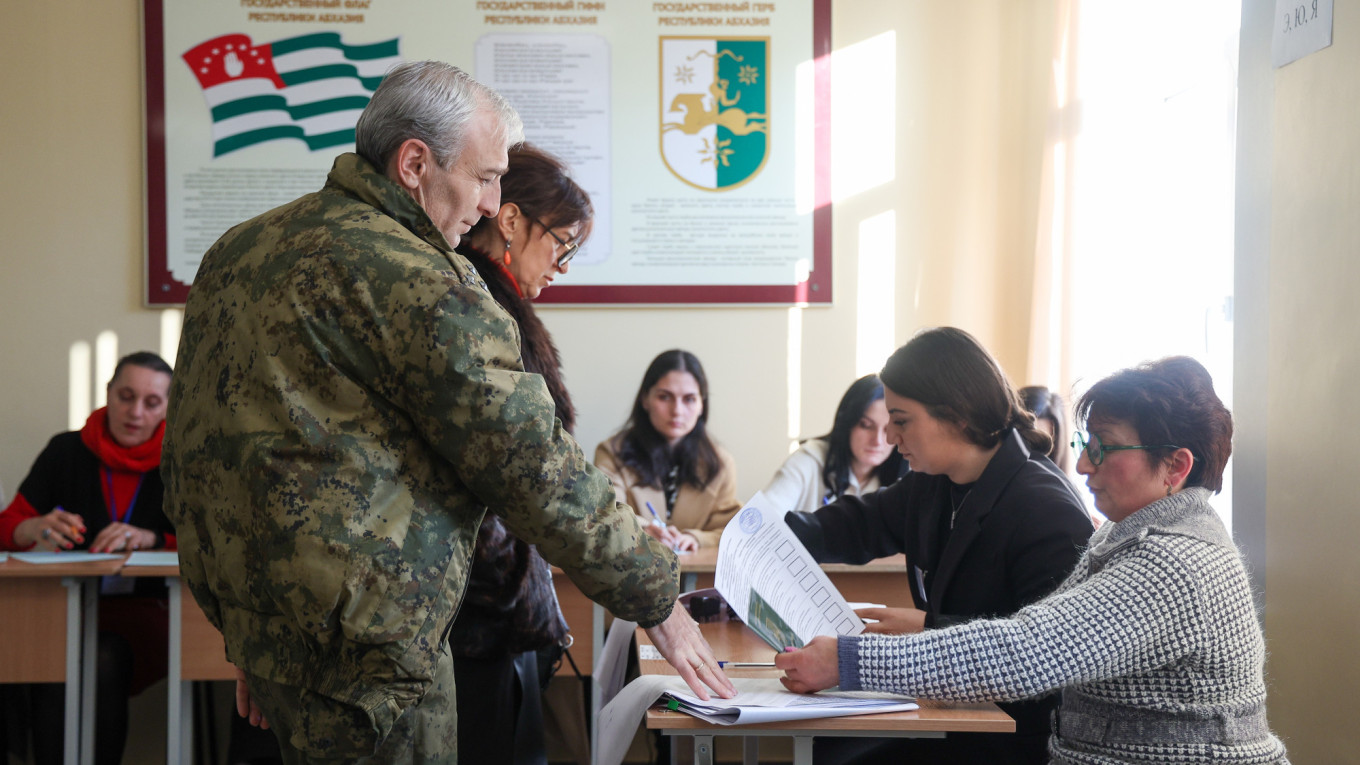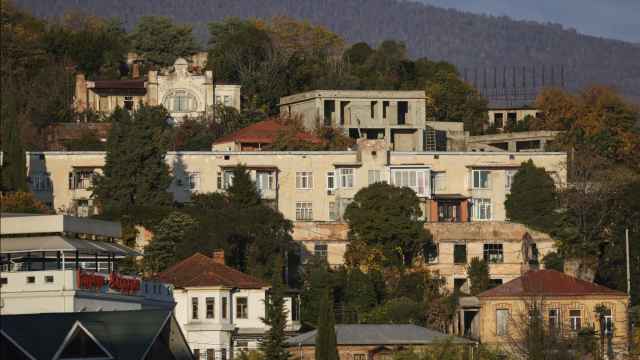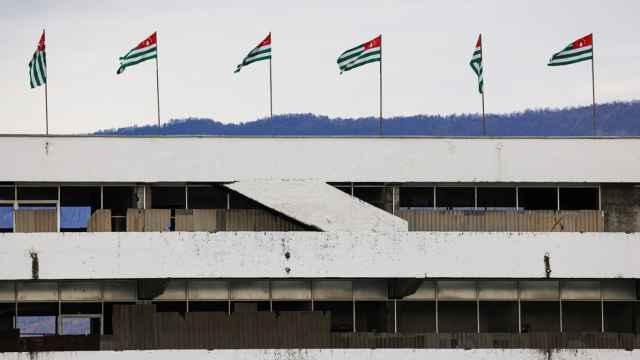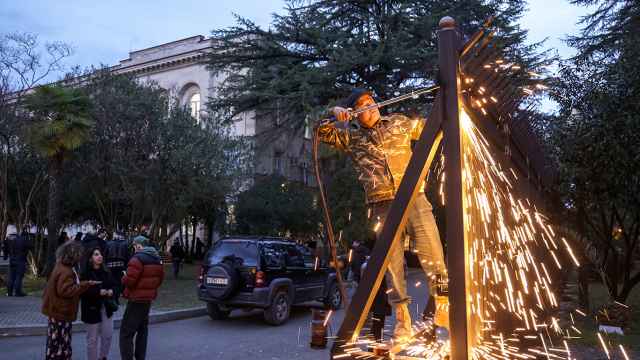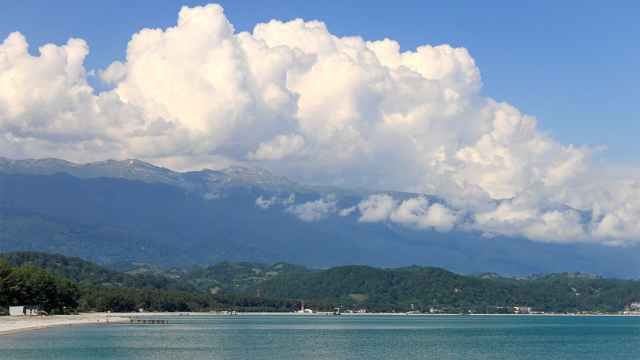For a place where leaders are more often than not forced out of office, elections in Abkhazia should be fairly routine.
But for many voters in the self-proclaimed independent state on the Black Sea — widely recognized as a Georgian breakaway region — something feels different about this weekend’s presidential election.
It could be because this is Abkhazia’s first election after mass political upheaval last fall. In November, protesters angry over a proposed investment agreement with Russia successfully pressured the de facto president, Aslan Bzhania, to step down. While heavily supported by Russia, Abkhazians are fiercely independent, and Bzhania was seen as sacrificing autonomy to please Moscow.
Voters are now set to choose between five candidates. If no candidate clears 50% of the votes, a runoff will take place within two weeks.
Whoever wins the contest in Abkhazia will set the tone for relations with Moscow, which has supported the breakaway region diplomatically, financially and militarily since the 2008 Russo-Georgian War.
But while Bzhania’s forced resignation represented a serious blow to the Kremlin’s control of the region, Abkhazians are not looking for any shake-ups in relations with Moscow.
Instead, the biggest prize for locals would be stability — an exit from the economic and political crises of recent years.
“I hope there will be a shift in terms of development,” said 24-year-old Naala in a phone interview from Sukhumi, Abkhazia’s capital. “There are a lot of spheres that are in stagnation — architecture, culture, electricity — a lot of needs that need to be covered.”
Naala requested that only her first name be published due to potential professional retaliation for speaking on political issues.
Last year was a difficult one, Naala said. The political opposition won big with Bzhania’s resignation, but some of the most intractable issues facing the largely isolated region were laid bare. For instance, electricity shortages — a perennial annoyance — pinched locals’ wallets and strained services.
In January, an electrical fire ripped through the beloved National Art Gallery in Sukhumi and destroyed nearly its entire collection, including many originals by Abkhazian artists. Locals noted that the fire’s outbreak coincided with the time when power was restored in a planned outage.
Young people, the driving force behind last year’s protests, now see an opening for a changing of the guard in Abkhazia’s political leadership.
The preferred candidate for many of them is 43-year-old Adgur Ardzinba, the former economic minister and leader of the opposition party Abkhazian People’s Movement.
Ardzinba, who was the runner-up in the 2020 presidential election with 35% of the vote, has made strides to portray himself as the obvious alternative to the previous administration. In the fall, he protested alongside young people, and recent weeks have seen him campaigning in villages across the region.
His messaging seems to have struck a chord. At campaign events, Ardzinba speaks to packed halls of voters. In a recent campaign video, he said that Abkhazia “must become a full-fledged participant in the international community,” although doing so is nearly impossible given the region’s disputed status.
Naala said that she made up her mind to vote for Ardzinba after watching a press conference featuring all the candidates on Jan. 31.
“He talked a lot about youth, working with young people, and he has a lot of supporters [who are] young people,” she said. “I hope there will be support for different initiatives that young people do here, because there are many good ideas.”
Three other candidates are registered for the election, but analysts agree the contest will likely come down to one of two frontrunners: Ardzinba and former vice president Badra Gunba.
Widely seen as Moscow’s preferred candidate, Gunba, also 43, briefly served as acting president after Bzhania’s resignation. He stepped down from the position in January after registering for the election, as required by Abkhazia’s de facto laws.
Both Ardzinba and Gunba would be the region’s youngest-ever de facto president, representing a generation that was too young to fight in a bloody war with Georgian forces in the 1990s.
Moscow appears to have taken an active role in propping up Gunba’s candidacy, something that has sparked controversy among locals.
When President Vladimir Putin’s domestic policy head Sergei Kiriyenko — reportedly a new envoy to the region — visited Abkhazia in early February, the only candidate he met with was Gunba, who at that point was not the acting president.
Shortly after, Gunba flew to Moscow to attend a series of meetings with high-ranking Russian officials including Foreign Minister Sergei Lavrov.
“What right does a presidential candidate have to represent Abkhazia at meetings of such a high level?” the Abkhazian activist collective Our Pitsunda asked in a statement. “Why is this being done bypassing the acting president?”
And yet, if Gunba’s aim was to demonstrate how he could strike a beneficial deal with the Kremlin, he succeeded.
On the same day that Gunba met with Lavrov, Moscow announced a slew of new benefits for Abkhazia: $3.6 million to fund government employee salaries and a commitment to restore the region’s electricity supply.
When Gunba returned home, his arrival was symbolic. The former vice president flew on a test flight between Moscow and Sukhumi’s long-shuttered airport, which officials are looking to open in May.
“It was really very spectacular,” said Olesya Vartanyan, an independent expert on conflicts in the South Caucasus, of the episode. “But on the other hand, it demonstrates not just the strength but also his weakness as a candidate.”
Vartanyan was referring to the albatross of Gunba’s campaign: his ties to the previous administration.
In Abkhazia, leaders need to strike a balance between appeasing Moscow and the independence-minded populace. The question on many voters’ minds is: Will the next president prioritize Abkhazia’s autonomy even when it goes against Moscow’s wishes?
Activist Naya Abidova, 23, believes voters already know what to expect with Gunba: “a logical continuation of Bzhania’s presidency.” Under the previous president, she said, the economy stagnated, and public services like infrastructure development and education “experienced a severe deterioration.”
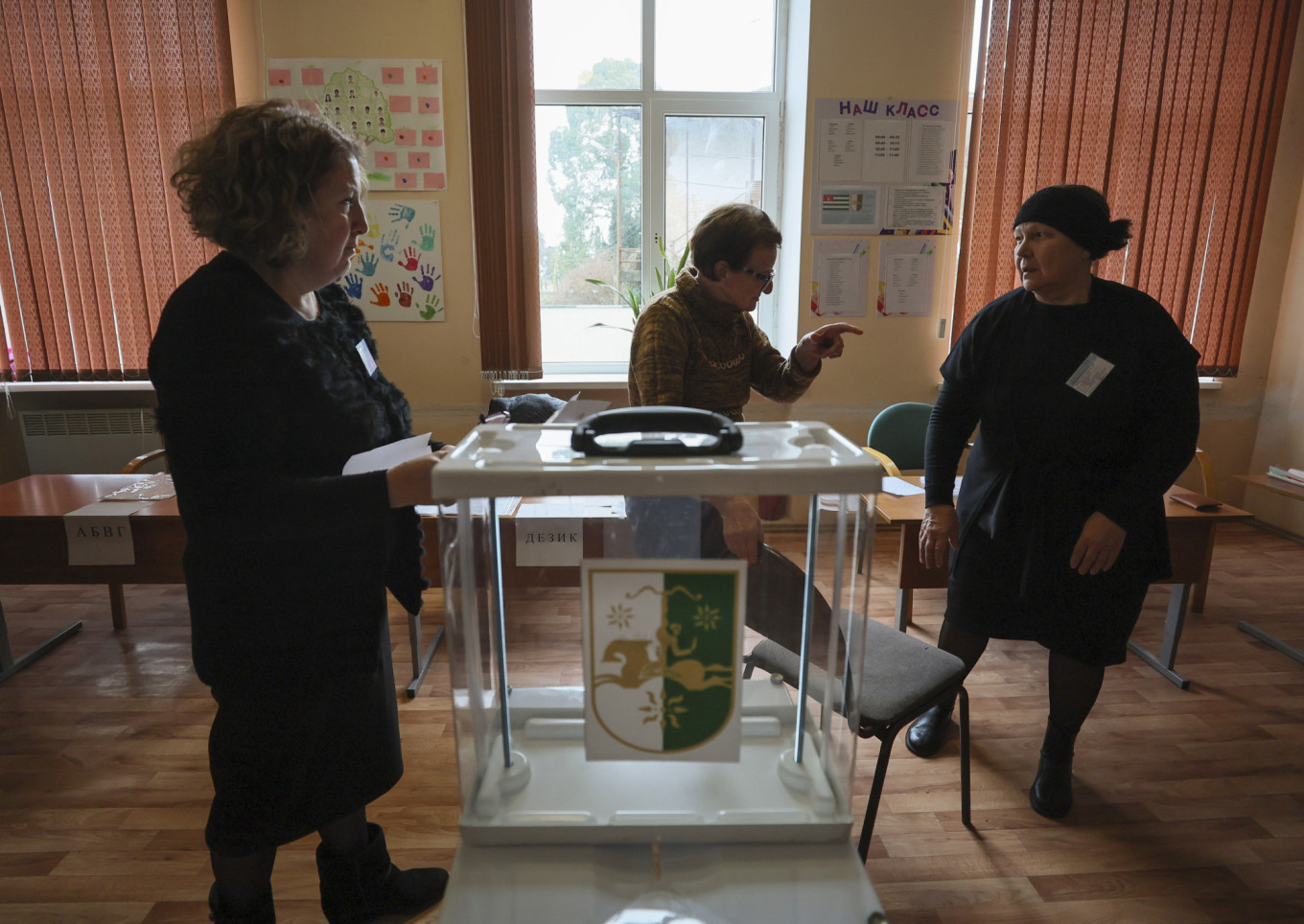
For her, a continuation of such trends would mean leaning more on Russia, and Abkhazia’s gradual loss of autonomy.
“I'm honestly worried that, instead of becoming more independent, we might lose independence itself,” she said of a situation in which Gunba wins.
While the controversial investment deal that sparked protests was struck down by lawmakers in December, Moscow has indicated that the issue is not over.
In late December, Russian Foreign Ministry spokeswoman Maria Zakharova said the Kremlin expects Sukhumi to abide by documents signed in 2020 regarding the “harmonization of legislation to create required conditions for Russian investments.”
No matter who is in charge, negotiating with Moscow is a necessity in Abkhazia. None of the individuals that The Moscow Times interviewed for this story suggested people want to disrupt that dynamic. Even protesters last fall carried Russian flags alongside Abkhazian ones — a sign that their fight was not with Russia.
Navigating Moscow’s demands could test the new president. Vartanyan agreed that relations with Russia under Gunba would likely resemble those of the previous administration; under Ardzinba, “there may be some differences, but nothing profoundly different.”
Gunba might bring back altered versions of controversial pro-Russian legislation, she suggested, adding that with Ardzinba, “they will have to revisit certain things, and it will be a headache, but I think they will still have to somehow comfort Moscow’s interest.”
But first, Abkhazia needs to make it through the election. The political environment is tense, and Vartanyan added that there is a chance that things could devolve into violence and chaos.
It would not be unheard of. In December, MP Adgur Kharaziya shot dead a fellow lawmaker, Vakhtang Golandziya, during a parliamentary debate on cryptocurrency mining.
While many are cautiously optimistic that this election can be the pivotal moment Abkhazia needs, others cannot escape the feeling that they have seen this all before.
Abidova, the activist, is begrudgingly planning to vote for Ardzinba, although she doesn’t expect Abkhazia’s fortunes to change.
“I don't think anybody can fix what's been going on,” she said, “so I'm just voting for the person who I believe is going to try.”
A Message from The Moscow Times:
Dear readers,
We are facing unprecedented challenges. Russia's Prosecutor General's Office has designated The Moscow Times as an "undesirable" organization, criminalizing our work and putting our staff at risk of prosecution. This follows our earlier unjust labeling as a "foreign agent."
These actions are direct attempts to silence independent journalism in Russia. The authorities claim our work "discredits the decisions of the Russian leadership." We see things differently: we strive to provide accurate, unbiased reporting on Russia.
We, the journalists of The Moscow Times, refuse to be silenced. But to continue our work, we need your help.
Your support, no matter how small, makes a world of difference. If you can, please support us monthly starting from just $2. It's quick to set up, and every contribution makes a significant impact.
By supporting The Moscow Times, you're defending open, independent journalism in the face of repression. Thank you for standing with us.
Remind me later.



